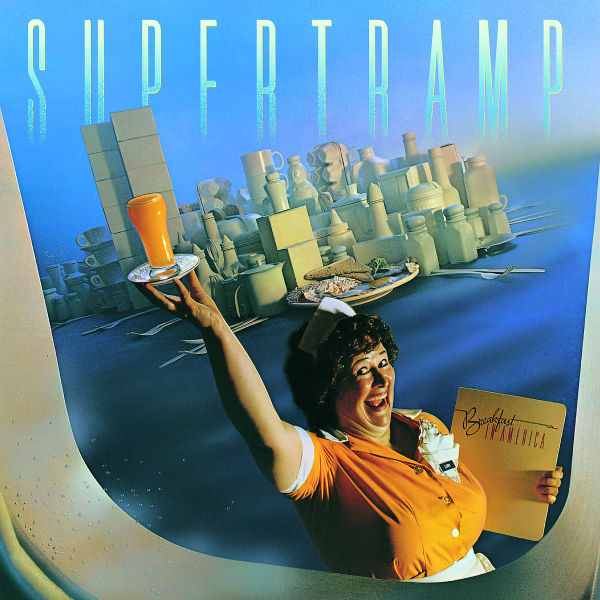 Yuriy P. - 10.12.2019 Yuriy P. - 10.12.2019  The sixth Breakfast in America album turned out to be the most commercially successful for this interesting team, which is not so common - after all, the guys played a rather original art rock that not everyone could like, especially considering his pomposity, and at that time, when punk thundered everywhere. However, this time the pop harmonies did their job, and all the songs from this album were in the top twenty in the UK. As before, the compositions are divided into those written by Hodgson (his voice began to resemble the Gibbs brothers very much) and Davis, but now the main instrument on them is now the piano and keyboards, although the guitars that played a significant role in previous releases do not remain side. At the same time, the texts became more interesting, and many of them relate to impressions of American reality, since in 1977 the guys moved to Los Angeles.
The opening album "Gone Hollywood" introduces the two vocalists together. The piano grows, the rhythm section enters (the guitar sometimes riffs quite hard); after the vocal part, the music quietens slightly, yielding the solo on the saxophone. From the text we learn about Hollywood, which is not as wonderful as it turned out, a place where you only understand that nobody needs you. At the end, our attention again appears gradually silencing saxophone, playing to the pulsating bass rhythm and piano.
Among other two-vocal compositions, there are several more. Firstly, it is “Goodbye Stranger”, a sort of confession of Lovelace, who in the morning always says goodbye to his next girlfriend, with whom he spent the night. At the beginning, the piano sounds (it seems Davis' favorite instrument, which is mainly sung here), the rhythm section appears, giving way to the piano for a while. Hodgson here for some reason sang a falsetto a la Bee Gees. In general, a very bright composition was obtained (despite the text). Towards the end, she becomes more fervent, the guitar sounds until the music subsides.
“Oh Darling”, where we again hear two vocalists, represents the recognition of the lyrical hero both in love and in the fact that he will not back down to get this girl for himself. Naturally, the song is built on the piano (and organ) game, however, the electric guitar is also present. Once again, it turned out to be quite provocatively, but here the text at least corresponds to the proper extent to the music.
Other things, except the final one, the guys are singing separately. There are only two Davis songs performed by him. This is Just Another Nervous Wreck. Again her piano foundation, only more and more energetically. The blues solo on the electric guitar under the organ turned out to be excellent. From the text we learn about a person who has become disillusioned with life in everything, and again here we observe some discrepancy between quite peppy music and not very cheerful lyrics.
Davis also introduced the ballad Casual Conversations. In the beginning, something like a vibraphone sounds, the piano, organ and guitar enter. A saxophone also appears. The song is a monologue of a man who is at odds with his chosen one and in the end invites her to leave, declaring that he will only be happy about this.
The most memorable, as before, are Hodgson's songs. First of all, this is the famous hit “The Logical Song” with emotional vocals and lyrics about the generation of the 70s, about the influence of society on every person, when you have to behave rationally, logically, respectably, etc., to be accepted. Music is more energetic, then lyrical. In the background you can hear the strings. The excellent saxophone solo with sharp piano chords is especially memorable.
The title pop composition, with clarinet solo, presents us with a humorous description of America, where there are many beautiful girls, as well as millionaires. She cheers up well, but too bad she’s too short.
“Take the Long Way Home” with a piano, harmonica and clarinet resembles a country, and its lyrics are devoted to various aspects of life, when along with the positive moments something still goes wrong.
“Lord Is It Mine” is a somewhat sad (unlike everything else) piano ballad with a clarinet solo, which is a kind of prayer in which the lyrical hero asks God to find himself in a place where he feels good.
The album closes with the energetic “Child of Vision”, the longest (over 7 minutes) and the most prog-rock thing on the album, although the keyboards and guitar here may resemble disco. The recall of vocals before the chorus, the chorus itself, as well as the long piano solo with accented chords is very memorable. The song expresses its attitude towards the Americans, who only live with their Coca-Cola and television, as if this is all in life.
Maybe not all lovers of art rock will like a large abundance of ballads, a jazz bias and an almost complete absence of darkness and depression (although the lyrics are sometimes somewhat pessimistic despite the softness of the music), but there's nothing to be done - the guys saw or wanted to see the world just like that .
|








![Supertramp - Live In Paris '79 (DVD+2CD) [US-Version, Regio 1/A]](https://img.grooves.land/images/cover/482/020/fa3y0mem.j11)

























